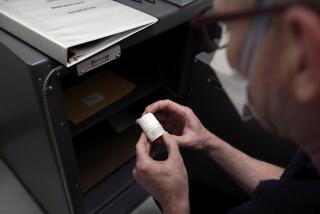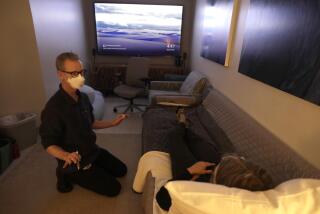Judge Allows Tobacco Suit to Go Forward
A Superior Court judge in San Diego County has permitted a massive fraud lawsuit against the major tobacco companies and the Council for Tobacco Research to go forward.
Late last week, Judge Robert E. May rejected arguments from the defendants that the case should be thrown out of court. However, it is not expected to go to trial until early 1998.
“This was a big win,” said Patrick J. Coughlin, attorney for the plaintiff. “This case could be huge; all we have to do is prove they said one thing and did something else.”
However, industry attorneys said they are confident of winning the case.
The lawsuit alleges that the tobacco industry deceived the public starting as early as 1954 when it announced the creation of an independent research council to investigate the alleged dangers of smoking. The industry also vowed to disclose the council’s findings.
The creation of the Council for Tobacco Research--made in the wake of media coverage of scientific studies that cigarette tar condensate caused fatal tumors in mice--was announced in advertisements in more than 400 newspapers nationwide.
The ads--titled “A Frank Statement to Smokers”--said the industry accepted “an interest in people’s health as a basic responsibility, paramount to every other consideration in ur business.”
“That was a lie,” Coughlin declared in a court hearing in San Diego late last month.
The council “wasn’t autonomous; it wasn’t independent,” Coughlin said at the hearing where industry lawyers attempted to get the case thrown out of court.
In reality, Coughlin asserted, the council was set up as a “front” group in an attempt to assuage the public and actively concealed research showing the dangers of smoking.
The council also has been named as a defendant in 17 lawsuits filed by states seeking to recover expenses incurred in treating indigent smokers.
The San Diego lawsuit seeks to compel the council and the companies to make public all the research done under the auspices of the council or cigarette company lawyers working with the council.
The lawsuit also asks that the companies be ordered to disgorge profits they made as a result of concealing information from the public.
The case was filed by Julia Cordova, a self-proclaimed nonsmoker from San Diego County, under the state’s unfair-business-practices statute, which permits an individual to sue on behalf of the general public.
Industry lawyers asserted that the lawsuit should be thrown out because it is preempted by the Federal Cigarette Labeling and Advertising Act and a California statute restricting product liability cases against the tobacco industry. But Judge May rejected both of those arguments in his written ruling.
As to the preemption argument, May ruled that “claims of fraudulent concealment or misrepresentation . . . based upon common law deceit” are not preempted by the federal law.
May also rejected the defendant’s other argument, saying the restrictions imposed by the California product-liability statute did apply to a case of the type filed by Cordova.
Maurice A. Leiter of Arnold & Porter, the lead lawyer for the defendants, said he is confident his side would ultimately prevail.
“This case is based on the misconception that notwithstanding decades of surgeon general warnings and government-sponsored public education campaigns that the public somehow is unaware of the risks associated with smoking,” Leiter said. “The case alleges that the industry through CTR somehow concealed scientific research from the public. The facts are going to show that this is simply not true.”
May’s order permits further document discovery and sets the stage for the plaintiffs to start taking depositions.
According to a brief Leiter filed in October, the defendants have already turned over 500,000 pages of documents to the plaintiffs. Coughlin said that figure is correct but he said the defendants’ claim that “thousands of those documents--a pile 10 feet high” are privileged and can’t be made public.
Coughlin--of the firm Milberg, Weiss, Bershad, Hynes & Lerach--said that in coming months, the plaintiff would challenge that claim and also attempt to obtain at least 1,500 council-related documents that were filed under seal in a New Jersey case nearly a decade ago and still have not been made public.
More to Read
Sign up for Essential California
The most important California stories and recommendations in your inbox every morning.
You may occasionally receive promotional content from the Los Angeles Times.










